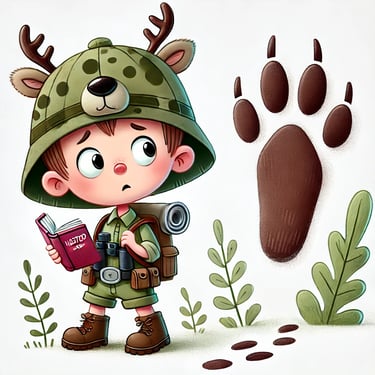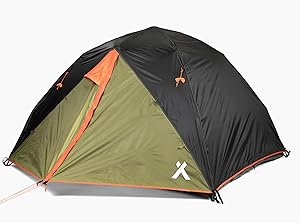The Surprising Effects of Hunting on Children: What Parents Should Know
Discover the effects of hunting on children, revealing how this activity fosters responsibility, patience, resilience, and a respect for nature in young hunters.
HUNTINGSATIRE
As an Amazon Associate, I earn from qualifying purchases. This means I may earn a commission if you click on an affiliate link and make a purchase, at no extra cost to you.




Bear Grylls Easy Up Tent


KLYMIT Insulated Static V Lite Inflatable Sleeping Pad | Comfortable, Lightweight, Easy to Inflate, Portable Air Bed for Hiking, Backpacking & Camping — Orange


GasOne Dual Fuel Portable Camping Stove 15,000BTU With Brass Burner Head, Dual Spiral Flame Gas Stove - Patented
1. Responsibility 🎯: Let’s Not Burden Them, Shall We?
Want to ruin your kid’s carefree life? Teach them responsibility! Handing them tools, teaching safety, and showing them how to respect life might make them think twice before making impulsive decisions. Imagine the horror: a child who understands that actions have consequences. Shudder. Who needs a kid who actually values the lives of others? Unthinkable.
2. Patience 🕰️: What Good Is It Anyway?
Ah, patience. Because what child needs to learn that good things come to those who wait? In hunting, your child has to sit quietly, track movement, and—brace yourself—observe. They might start developing focus, a sense of timing, and even an appreciation for nature’s pace. Seriously, who needs that when they could be swiping mindlessly on a screen for hours?
3. Self-Sufficiency 🔪: The Dreaded Independence
Self-sufficiency: the stuff of nightmares! When a child knows how to navigate, track, and take care of themselves in the wild, they’re basically set up for a life of unnecessary competence. Do you want them cooking their own meals, understanding where food comes from, and confidently managing life’s challenges? Ugh. Keep them dependent, or risk them becoming, you know, capable.
4. Problem-Solving 🧩: Because Life’s Better When You’re Helpless
Hunting is filled with challenges that require actual thought. Kids will face unpredictable situations, like tracking an animal or navigating rough terrain. They might develop something truly alarming—problem-solving skills. Imagine them thinking on their feet, assessing risks, and making decisions. Who would want a kid with that kind of self-assured confidence? Best to stick to situations where they don’t have to use their brain.
5. Respect for Nature 🌲: This Could Go So Wrong
As your child spends time outdoors, they may start to appreciate the beauty and balance of nature. They’ll learn to respect the environment, understand ecosystems, and—brace yourself—value wildlife. Next thing you know, they’ll be preaching conservation and talking about preserving natural habitats. Sounds like a fast track to “tree-hugger” territory, doesn’t it? Keep ‘em indoors, safe from the idea that the planet might actually be worth saving.
6. Mental Resilience 💪: For Kids Who Don’t Know When to Quit
Hunting isn’t all success stories. Sometimes you miss the target. Sometimes it rains. Sometimes things don’t go as planned. Guess what that teaches? Resilience. If your child learns to handle disappointment, push through challenges, and try again, they might grow into the kind of person who doesn’t back down in the face of adversity. No parent wants that! Raise a quitter—it’s far less work.
7. Physical Fitness 🏃: A Really Unfortunate Side Effect
Outdoor activity might make your child physically fit. Hiking, tracking, and carrying gear could make them strong, coordinated, and healthy. How are they supposed to fit in with their screen-loving, snack-devouring peers if they’re out there gaining stamina and agility? Be warned: a child who enjoys the outdoors might grow into an adult who enjoys exercise. Gross.
8. Community and Bonding 🤝: Beware of Meaningful Relationships
One of hunting’s more sinister side effects? Strong family bonds. Picture this: your child, laughing with family, learning from elders, and forming close connections with friends who share their interests. Is that really what you want for them? Don’t even get me started on youth hunting programs—they’re basically breeding grounds for lifelong friendships. If you prefer your child alone and screen-glued, it’s best to keep them as far from hunting as possible.
9. Ethics and Responsibility 🏹: Like We Need Kids Thinking About Consequences
Hunting introduces kids to ethical questions about sustainability, life, and balance. They’ll learn to think carefully about their choices, consider the impact of their actions, and make informed, responsible decisions. Can you imagine? Kids who are mindful of their impact? Who treat life with reverence? Keep the moral high ground as low as possible to avoid these unwelcome traits.
10. Education Beyond Books 📚: Knowledge Without a Textbook? The Horror
Hunting is an education in disguise. Biology, geography, physics—kids who hunt end up with hands-on knowledge that sticks. By observing animals and understanding ecosystems, they’re getting the ultimate crash course in the real world. Worse, they may start questioning things, thinking critically, and forming their own opinions. If you want your child unbothered by curiosity, best to avoid hunting at all costs.
References (APA Style)
American Hunting Association. (2023). The benefits of teaching kids to hunt responsibly. American Hunting Journal.
Child Development Research Institute. (2023). Psychological impact of outdoor activities on youth. CDRI Research Journal.
Nature Conservancy Institute. (2022). How nature fosters respect and responsibility in children. Nature Journal.
Outdoor Ethics Foundation. (2023). Ethical hunting practices and child development. Ethics Quarterly.
Smith, L. (2022). Physical fitness benefits of outdoor activities for children. Health & Fitness Review.
If you found this “helpful,” you’ll absolutely adore some of our other must-read guides:
How to Get Lost While Hunting: A Guide—because nothing says adventure like not knowing where you are.
The Enchanted Hunt Adventure—join us on a totally "magical" journey through blades, teas, and leather armor.
Self-Improvement Burnout Guide—for when you're just so done with all this improvement nonsense.
The SAS Survival Handbook Guide—because reading about surviving is practically surviving, right?
How to Find the Best Hunting Knives Near Me—don't hunt without the perfect blade at your side.
Funny Hunting Mistakes—laugh, learn, and try not to repeat them!
Deer Hunting Rut Tips 2024—because it's never too early to get ready for the rut.
Enjoy the journey of raising a hunting-savvy kid—or keep them away from these "dangers" if you can!
